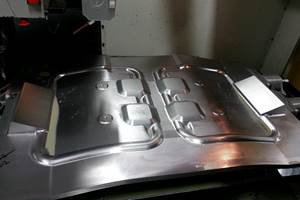Software Charges CMMs
Eagle Manufacturing is a supplier of engine components to Ford Motor Company and Navistar International, a leading manufacturer of trucks, school buses and midrange diesel engines. Eagle’s 120-person facility produces cylinder heads, connecting rods and accessory brackets for diesel engines; lower crankcase housings for gasoline engines; exhaust manifolds for V8 and V6 engines; and 5.4-liter engine blocks.
Share






Eagle Manufacturing (Florence, Kentucky) is a supplier of engine components to Ford Motor Company and Navistar International, a leading manufacturer of trucks, school buses and midrange diesel engines. Eagle’s 120-person facility produces cylinder heads, connecting rods and accessory brackets for diesel engines; lower crankcase housings for gasoline engines; exhaust manifolds for V8 and V6 engines; and 5.4-liter engine blocks.
To produce more than 260,000 of these components per year, the company relies on a Sheffield RS-150 CMM with Sheffnet/OFI and a Sheffield 1808-M CMM with Sheffnet/OFI to perform receiving and in-process operations, final inspections and occasional unscheduled layouts.
Faced with the demand to produce higher volumes of parts in shorter lead times, the company needed to upgrade its existing equipment. Although finished components were of high quality, CMM programming and setup time were routine stumbling blocks to the overall production process. The challenge was to find a solution that would not sacrifice high-level programming flexibility for ease of use and vice versa.
“Programming time was long and slow,” says quality engineer Richard Criswell. “We needed CMM software that was user-friendly, without any restrictions on flexibility. We also had to accommodate a wide range of user experience levels.”
To meet these objectives, Eagle researched four different types of commercial software before choosing the CAMIO and LaunchPad software developed by LK Metrology Systems, Inc. of Brighton, Michigan. “There used to be two types of CMM software available,” Mr. Criswell remarks. “One type was user-friendly and easy to use, but very restrictive, with no depth or flexibility. The other kind was capable of doing any task, but the complex programming required was not supported by the workforce. This is not what we’ve experienced with CAMIO and LaunchPad,” he continues. “They’re easy and enjoyable to use but still have the power to get the task done.”
This flexibility and ease of use is made possible by LK-DMIS. DMIS, or Dimensional Measuring Interface Standard, is a standard programming protocol that supports CMM programming using data pulled directly from the CAD system. DMIS-based software, including CAMIO and LaunchPad, provide a vehicle for efficient bi-directional communication of inspection data between CAD systems and CMMs, thereby easing the measurement task and saving design and verification time.
Eagle retrofitted its Sheffield CMMs with the LK2000 DCC controller and CAMIO and LaunchPad software in the spring of 1999. After installing the upgrades, LK Metrology Systems took responsibility for any services needed on the retrofitted machines. Since then, programming time has been cut in half, and in some cases, measuring operation speed has increased by as much as 75 percent.
Mr. Criswell credits this new efficiency to the software’s user-friendliness. “Operators appreciate how easy it is to use LaunchPad,” he notes. “They enjoy interacting with Windows, and they especially like the CAMIO Graphical Reporting, which provides them with a faster, simpler method for analyzing data.”
CAMIO is a flexible, three-dimensional CMM software suite that provides a direct link between CAD/CAM and inspection operations. The software generates inspection programs from solid, surface or wire-frame CAD data files using a geometric software module for prismatic parts and a surface analysis package for formed parts. The optional graphical reporting feature produces full-color graphic inspection reports based around the component CAD model. LaunchPad allows the operator to carry out various inspection programs using “point and click” capabilities and provides complete component positioning and program launching instructions using a graphic menu.
“The ability to program online and execute each command one at a time, and to stop the program and re-measure has saved us significant time and costs,” states Mr. Criswell. “If you’re halfway through or further when you hit an error, the ability to keep on going can really add up.”
Switching from Sheffield to the new LK2000 controller eliminated all previous service issues and improved reliability. By providing an advanced controller package, LK2000 and CAMIO gave the aging machines all of the capabilities of new CMMs.
Mr. Criswell also identifies faster, easier operator training as a major contributor to higher plant efficiency. “LK software may be used by personnel of all levels of experience,” he says. “Prior to retrofitting, only skilled programmers were able to use the old software effectively. Of all of the programs we considered, only LK’s bridges that gap.”
Related Content
The Role of Surface Finishing in Modern Manufacturing: Trends and Best Practices
You’re attending IMTS to advance your business. Regardless of your role in the manufacturing process, considering how your parts will be finished is crucial. This article can help you understand trends in surface finishing and better communicate with your finishing partners.
Read More4 Tips for Staying Profitable in the Face of Change
After more than 40 years in business, this shop has learned how to adapt to stay profitable.
Read MoreSunnen Products Company Partners With Hendrick Motorsports
The partnership puts the new Sunnen SV-series honing machine in the Hendrick Motorsports engine operation alongside other Sunnen honing and engine building machines.
Read More6 Ways Electrification is Shifting Automotive Manufacturing
Trends to watch at IMTS: A Tier One transmission supplier weighs in on how hybrid and electric vehicles are changing the requirements for automotive component producers.
Read MoreRead Next
Machine Shop MBA
Making Chips and Modern Machine Shop are teaming up for a new podcast series called Machine Shop MBA—designed to help manufacturers measure their success against the industry’s best. Through the lens of the Top Shops benchmarking program, the series explores the KPIs that set high-performing shops apart, from machine utilization and first-pass yield to employee engagement and revenue per employee.
Read MoreAMRs Are Moving Into Manufacturing: 4 Considerations for Implementation
AMRs can provide a flexible, easy-to-use automation platform so long as manufacturers choose a suitable task and prepare their facilities.
Read More




















